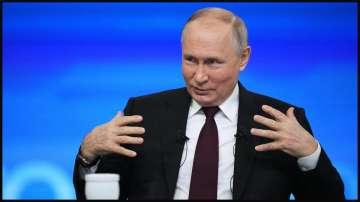'Peace after achieving our goals': Putin says Moscow's goals in Ukraine remain unchanged
The Kremlin leader vowed to achieve the "de-Nazification, de-militarisation and a neutral status of the country" of Ukraine as part of its "special military operation". Offering a rare detail, Putin said that a total of 617,000 Russian troops are currently fighting in Ukraine.

Russian President Vladimir Putin on Thursday affirmed that his goals in the ongoing war in Ukraine remain unchanged and that there would be no peace until they are achieved. The Kremlin leader listed his goals as "de-Nazification, de-militarisation and a neutral status of the country" of Ukraine.
Addressing his end-of-year news conference, where ordinary Russian citizens and journalists submitted questions for the Russian President for two weeks, Putin said: "There will be peace when we will achieve our goals." He maintained that Ukraine remains heavily influenced by neo-Nazi groups and demanded that Kyiv must not join the North Atlantic Treaty Organisation (NATO) alliance.
The Kremlin has since repeatedly said that the “special military operation” in Ukraine will continue until those loosely defined goals are achieved. Putin made his remarks in a rare interaction with international journalists, after heavily limited his interactions with foreign media since Russia invaded Ukraine last year.
Putin's appearance is primarily aimed at a domestic audience and will be a chance for him to personally resolve the problems of ordinary Russian citizens and reinforce his grip on power ahead of the March 17 election, where he is running for his fifth presidential term.
617,000 Russian troops in Ukraine: Putin
Offering a rare detail, Putin said that a total of 617,000 Russian troops are currently fighting in Ukraine, including 244,000 soldiers who were called up to fight alongside professional military troops. The Russian President also dismissed another wave of mobilisation after his decision to draft 300,000 men last year proved unpopular.
This came after reports emerged that some Russians were openly fighting for the Ukrainian Army to overthrow Putin's political administration from the country. The Siberian Battalion is a unit made up of Russians who have joined Ukrainian military ranks to fight against their homeland, hoping someday to help oust Putin.
The Russian President also mentioned that Russian forces have destroyed around 747 Ukrainian tanks and 2,300 armoured vehicles of several types since Ukraine's 'failed' counteroffensive launched in June, reported TASS news agency. He also claimed that 400 tanks were sent to Kyiv by Western countries.
He also noted that certain parameters for demilitarisation had been agreed on during the talks in Istanbul in early 2022 between the two warring countries, but that the agreements reached were later "flushed down the drain".
Putin's Ukraine challenges
What Putin expected to be a quick campaign in 2022 to establish Kremlin control over its neighbour has turned into a grinding war of attrition that has incurred massive personnel losses and drained Russia's resources. While Russia has prevented Ukraine's army from making any significant gains during its summer counteroffensive, the Kremlin doesn't have enough manpower and equipment to mount any major campaigns of its own.
Putin expects that continuing warfare will gradually exhaust Ukrainian resources and undermine Western support for Kyiv, but a protracted conflict also exacerbates Russia's economic woes, deepens social problems and fuels divisions within the ruling elite.
Despite Moscow's hopes that Western assistance for Ukraine will dwindle amid growing fatigue with the war and election campaigns in the US and other Western countries, Washington and its allies have vowed to continue supporting Kyiv for as long as necessary. Recently, newly-appointed pro-EU Polish President Donald Tusk has vowed to increase support for Kyiv.
Putin has sought to counter the sanctions by strengthening ties with China, which has become a key market for Russian oil and gas and a source of high-tech imports, and North Korea for military technology. The tug-of-war continues as US President Joe Biden appealed to Republicans in Congress to provide more aid for Ukraine.
Ukraine's own challenges
Ukrainian President Volodymyr Zelenskyy has faced his own problems with diminishing military and economic aid from the US and other countries. Prospects for additional US aid to Ukraine appeared seriously delayed, if not in grave doubt, despite his whirlwind diplomacy during a recent visit to Washington.
The US has already provided Ukraine with $111 billion since Russian President Vladimir Putin launched his grinding invasion more than 21 months ago, but Republicans are insisting on linking any more money to strict US-Mexico border security changes that Democrats decry.
Zelenskyy made his own case in his private meetings with congressional leaders — that Ukrainian forces have fought fiercely to push back the Russian invasion with the help of American and other Western allies and it's no time for Ukraine's friends to step back.
“The fight we're in is a fight for freedom," Zelenskyy repeatedly said in the meetings on Capitol Hill, according to lawmakers. Elsewhere meanwhile, more than 130 senior lawmakers from across Europe signed a letter urging US lawmakers to continue their support for Ukraine.
European countries like Slovakia, Bulgaria and Hungary have also opposed giving more aid to Ukraine, due to their pro-Russia stance. Hungarian leader Viktor Orban has become a major headache for EU policies on Ukraine and its sanctions imposed on Russia.
(with agency inputs)
ALSO READ | BIG blow to Putin: Russian youths joining Ukrainian Army to fight against their own country